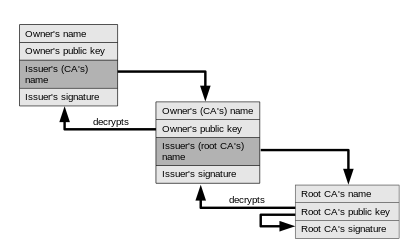Root certificate

In cryptography and computer security, a root certificate is an unsigned or a self-signed public key certificate that identifies the root certificate authority (CA).[1] A root certificate is part of a public key infrastructure scheme. The most common commercial variety is based on the ITU-T X.509 standard, which normally includes a digital signature from a certificate authority.
Digital certificates are verified using a chain of trust. The trust anchor for the digital certificate is the root certificate authority.[2]
A certificate authority can issue multiple certificates in the form of a tree structure. A root certificate is the top-most certificate of the tree, the private key of which is used to "sign" other certificates. All certificates immediately below the root certificate inherit the trustworthiness of the root certificate—a signature by a root certificate is somewhat analogous to "notarizing" an identity in the physical world. Certificates further down the tree also depend on the trustworthiness of the intermediates, often known as subordinate certificate authorities.
Many software applications assume these root certificates are trustworthy on the user's behalf. For example, a web browser uses them to verify identities within TLS secure connections. However, this implies that the user trusts their browser's publisher, the certificate authorities it trusts, and any intermediates these certificate authorities may have issued a certificate-issuing-certificate, to faithfully verify the identity and intentions of all parties that own the certificates. This (transitive) trust in a root certificate is the usual case and is integral to the X.509 certificate chain model.
The root certificate is usually made trustworthy by some mechanism other than a certificate, such as by secure physical distribution. For example, some of the most well-known root certificates are distributed in the Internet browsers by their manufacturers. Microsoft distributes root certificates belonging to members of the Microsoft Root Certificate Program to Windows desktops and Windows Phone 8.[3]
See also
- Let's Encrypt
- CAcert.org
- Comodo
- DigiCert
- Entrust
- GlobalSign
- Verisign
- DNS-based Authentication of Named Entities, a working group developing protocols that allow certificates to be bound to DNS names using Domain Name System Security Extensions (DNSSEC)
References
- ↑ "What Are CA Certificates?". Microsoft TechNet. 2003-03-28.
- ↑ "Root certificate authority". 2015-07-23.
- ↑ "Windows and Windows Phone 8 SSL Root Certificate Program (Member CAs)". Microsoft TechNet. October 2014.
External links
- Windows and Windows Phone 8 SSL Root Certificate Program (Member CAs)
- iOS 8: List of available trusted root certificates